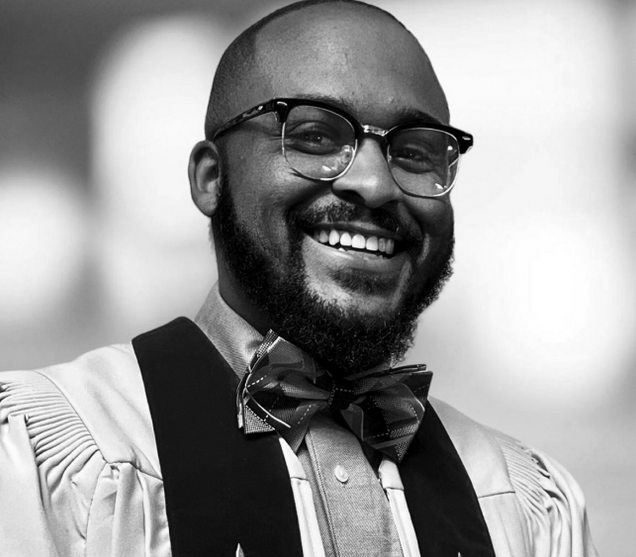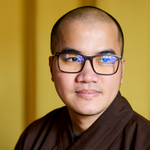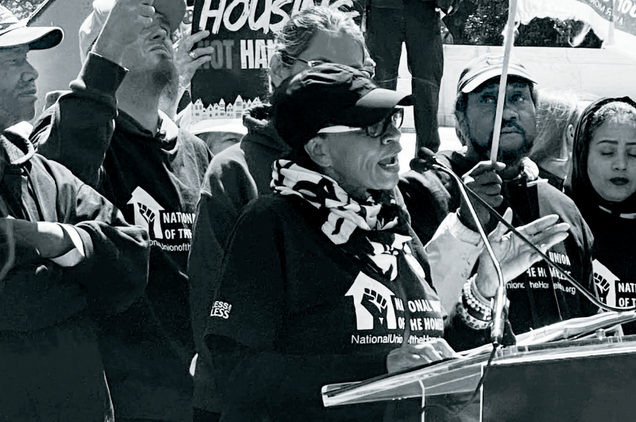This article was written by Mara Sassoon and originally published in the 2025 issue of focus magazine, the annual publication of the BU School of Theology. This article can be found on page 14.
STH’s Online and Hybrid Programs allow students to work for change in their communities
Building community gardens.
Advocating for the poor and unhoused.
Creating welcoming spaces for LGBTQIA+ people.
School of Theology students make their communities better in many meaningful ways, and the STH programs they are enrolled in help them find even more inspiration.
When STH relaunched its hybrid Doctor of Ministry (DMin) in 2016, it sought to provide an advanced degree program that active religious leaders, organizers, and chaplains could pursue from anywhere while continuing to work in their communities. The three-year, low-residency hybrid DMin, which focuses on transformational leadership, is a mix of online learning with occasional intensive on-campus classes.
“What’s so incredible about the DMin program is there is an immediate, real-world application that happens with students’ studies,” says Debbie Brubaker (’11), director of STH’s Online and Hybrid Programs. “Whatever they’re working on in class is often immediately relevant to a pressing question that they have.” The programs include the DMin and the online Master of Arts in Religion and Public Leadership (MARPL), launched in 2023.
Brubaker adds that a hallmark of the DMin program is its diversity. “You have folks talking across faith traditions,” she says. It is also STH’s most racially diverse student body by degree program. “And it is a very multigenerational program. As an educator in the program, being able to be in a classroom and collaborate with folks who are at these different stages and seeing the way that those conversations unfold—it’s really beautiful.”
The success of the DMin inspired the creation of the MARPL, STH’s first fully online degree program. It’s designed for people working in more diverse fields outside of ministry—including nonprofits, business, and education—and has a curriculum rooted in public theology and leadership.
We spoke with five students in the DMin and MARPL programs about their studies, how they are balancing their coursework and activism, and how their classes have informed their work.
 DeAndre Carswell (’26)
DeAndre Carswell (’26)
Industrial engineer DeAndre Carswell (’26) used to travel a lot for his job manufacturing airplanes and submarines. One day, he was working in an airplane hangar when he experienced the call to attend divinity school. “I just felt, hey, there is something more that I have to do,” he says. After earning an MDiv from Virginia Union University in 2023, he moved back to the city where he grew up, Portsmouth, Va., to become the senior pastor at Prince of Peace Church, which his great-great-greatgrandfather founded in 1902. “The same building is still there,” says Carswell, who continues to work full-time as an engineer while leading his church community. Before long, he realized he wanted to continue his education. “Our church is nestled between three communities that are the most violent in our state,” he explains. “I felt I needed specialized training to deal with some of these things.” Carswell, who was drawn to the DMin by its focus on transformational leadership, consistently calls upon lessons from his STH courses. “Our church has been standing since 1902,” he says. “Debbie Brubaker’s Sacred Spaces class taught me that change can sometimes take longer in places like this—where this is all the people knew, this was the only place that was their sacred space. People’s emotions are tied to those things as well.” Brubaker’s class also inspired his idea for a fundraising campaign, which aims to raise $36,000 in 36 months and has already helped the church complete some renovations and start a community garden and a food donation program. “I don’t want us to turn into a new place,” he says. “I want us to get back to our former glory and to be able to enhance and modernize our ministry.”
Tien Nguyen (’26)

When Tien Nguyen (’26) was 15, he traveled a few hours from his home in a rural Vietnamese province to Ho Chi Minh City to become a Buddhist monk. He trained in a traditional Mahayana Buddhist monastic setting for seven years. After that, he continued his studies, earning a bachelor’s degree at International Buddhist College in Thailand and master’s degrees at Naropa University in Colorado and Harvard Divinity School. He says the programs opened his eyes to different Buddhist traditions and changed his perspective on religion in general. Nguyen is a dharma teacher and leader at Temple Vietnam in Roslindale, Mass. He’s also founded a new Buddhist organization in Brockton, Mass., which he calls “an experiment for my new way of teaching and leading.” This new way has been informed by the classes he is taking in STH’s hybrid DMin program, which is giving him the tools to lead a younger generation. Nguyen sees himself as part of a new wave of Buddhist leaders in America. “The previous generation of leaders has been busy providing care for the first immigrant generation, who mainly speak Vietnamese,” he says. “I’m someone who could bridge the gap, reaching the second and third generations.”
“I’m someone who could bridge the gap, reaching the second and third generations.” Tien Nguyen (’26)
Savina Martin (’25)
Growing up in Roxbury, Mass., during the Civil Rights era, Savina Martin (’25) would often catch a Green Line trolley to Comm Ave and walk up and down the street. She’d pause to admire the School of Theology building at 745 Commonwealth Ave., where Martin Luther King, Jr. (GRS’55, Hon.’59) had taken a class or two. “I would look at the edifice and think, ‘I would never be able to go to that school,’” she says. But in 2023, Martin—who’s had a decadeslong career in activism, mostly focused on homelessness—decided to apply to the Master of Arts in Religion and Public Leadership at STH. She will complete the program this year. “So my motto is, it doesn’t matter how old you are,” she says, “if it’s within your purpose and your calling, it will find you, keep you, and get you to where you need to go.” Today, Martin is one of three chairs of the Massachusetts branch of the Poor People’s Campaign, a national organization launched in 2018 to address systemic racism and poverty. Joining the MARPL program is “the last step in her calling,” she says. It’s helped her rethink how she approaches her work as an activist and public theologian. “Every course has challenged us to reflect on how we perceive the world and its potential for transformational change toward a better future,” she says. “What is working? What is not? And how will you approach changing it? The work is demanding and difficult, but this is an exciting time in history to be alive—and to be at STH.”
Kealani Nunes Willbanks (’26)

She thought she’d found her purpose in overseeing church finances. Kealani Nunes Willbanks (’26), associate pastor and executive director of operations and impact at Foundry United Methodist Church in Washington, D.C., has added to that mission: dismantling modern-day colonization. Nunes Willbanks, who has an MBA and who worked in finance for many years before pursuing a master’s degree at Fuller Theological Seminary, was drawn to Foundry because of its background in activism and social justice. During the racial reckoning of 2020, she was deeply affected by witnessing both peaceful protestors and the heavy military response to them. “Seeing that firsthand was disturbing,” she says. “That was when I started on my journey toward decolonization work.” To begin that journey, Nunes Willbanks enrolled in STH’s hybrid DMin program. The granddaughter of Filipino immigrants, she is writing her dissertation on the Filipino concept of Kapwa, which roughly translates to a shared identity and connectedness with others. The concept relates directly to her decolonization work, with its emphasis on equity and social justice. “My DMin project reclaims the Indigenous spiritual practice of Kapwa, embodied by the Filipino ancestors. I hope to offer this as an accessible resource to other Filipino clergy, reflecting the possibility that Kapwa can be a Christ-centered model of seeing yourself in others and building a generous community together,” she says. “It’s been a gift and healing balm to follow the voices of my ancestors. I also became a Lola [grandmother] last year. The idea that I am an ancestor to others profoundly resonates with me.”
“My DMin project reclaims the Indigenous spiritual practice of Kapwa, embodied by the Filipino ancestors.” Kealani Nunes Willbanks (’26)
Edwin Perez, Jr. (’27)
The son of a pastor, Edwin Perez, Jr. (’27) wanted to follow in those footsteps since he was a child. But there was a problem: Perez identifies as queer, which was a nonstarter in his evangelical congregation. “It means I had a fair share of church hurt and trauma,” Perez says. So Perez discarded his pastoral dream. He spent a few years as a medical assistant. “I loved helping people,” he says, “and that was the next best thing.” He went to school to study nursing, but after taking one class on philosophy and ethics, he switched majors to philosophy with a concentration in religious studies. “That was what really opened the door again for me to reconnect with the church,” he says. “I came to a more progressive and a more open church and picked back up there.” Perez, who received his MDiv from Yale, is a part-time general pastor at Manantial de Gracia United Church of Christ and a three-quartertime senior transitional minister at the Congregational Church of Naugatuck in Connecticut. He’s been pastoring for nine years and in that time has done advocacy work around all of Connecticut and across the country. During the first Trump presidency, he participated in a network of clergy that supported families and individuals who were at risk of becoming deported. “We did all that we could so that asylum judges would hear their cases,” he says. “I’ve also done a lot of work with the LGBTQIA+ community, both in the Latine intersectional experience and more broadly with workshops around reconciling faith, sexuality, and identity.” During his tenure, the Congregational Church of Naugatuck passed a resolution in 2023 to declare itself open and affirming to the LGBTQIA+ community. Just after finishing his degree at Yale, Perez felt he had more to learn and enrolled in STH’s hybrid DMin program. Perez, who is also a per diem hospital chaplain, says he’s benefited from hearing stories of the work his DMin peers are doing in their communities and from Eunil David Cho’s course, Spiritual Care and Social Justice. “I’ve come across more texts and more resources touching on the need for social justice to be present in chaplaincy and in spiritual care,” he says. “Not only is it compatible, but there’s an ethical imperative for social justice to present itself in the work of chaplaincy.”


